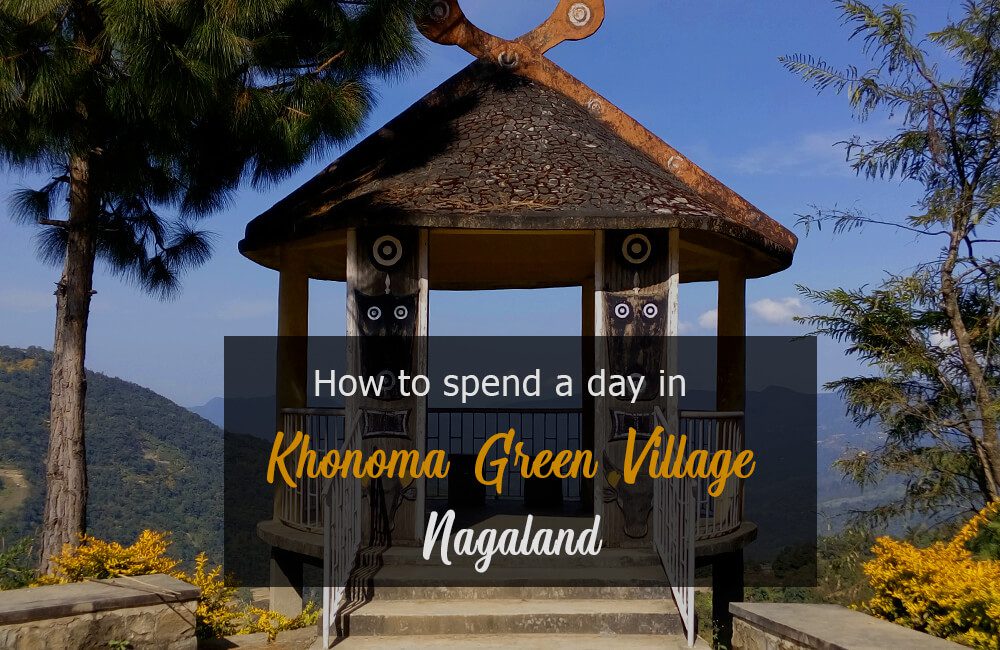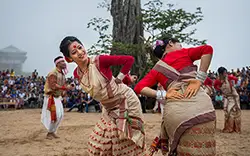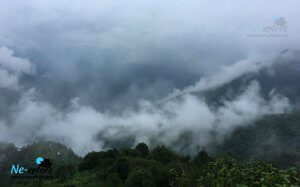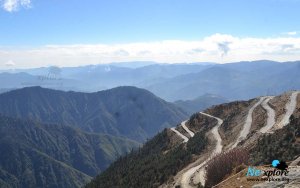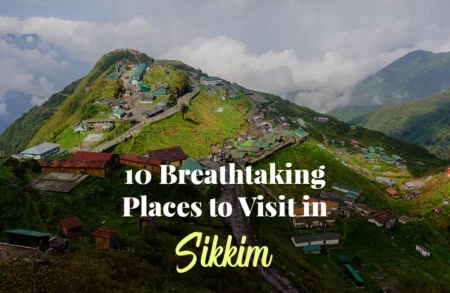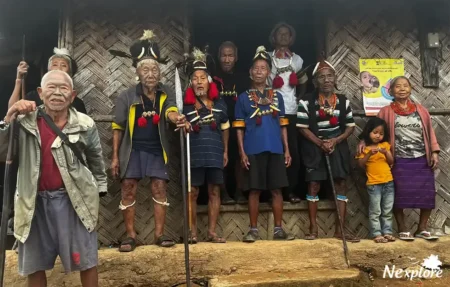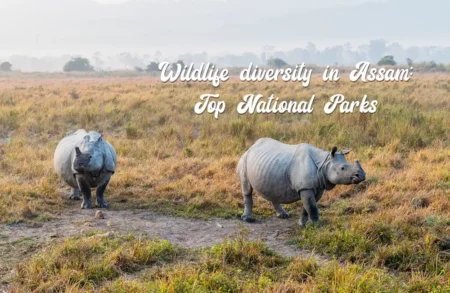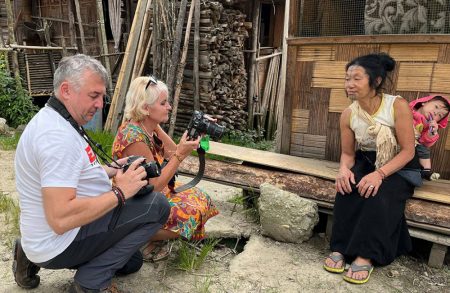Khonoma is a stunning village, known as India’s first green village, is a shining example of how conservation and culture can go hand in hand. Tucked away in the hills of Nagaland and home to the Angami tribe, this village is a model for sustainable living and eco-tourism. It is one of the secret places in Northeast India, hidden behind the majestic hills of Kohima. .Visitors to Khonoma not only get to experience breathtaking landscapes and rich traditions but also have the opportunity to travel responsibly and make a positive impact.
If you are thinking of visiting Khonoma village in Nagaland, then this guide is for you. I will tell you what to see and do if you are in Khonoma
Starting from the terrace paddy fields, old forts, to mind-blowing scenery, wildflowers and butterflies, there’s lots to explore in this small village named Khonoma. Traversing through the hilly roads, when we reached the village of Khonoma gentle bridge welcomed us. It’s truly a magical village adorned with a pleasant sight anywhere you look. Though it is the rice fields, or the home of Angami Nagas, everywhere you can see the magic of colour. Our Khonoma travel guide will help you to uncover all the attractions you can explore in Khonoma village.
You may be interested in Things you don’t want to miss on your trip in Kohima
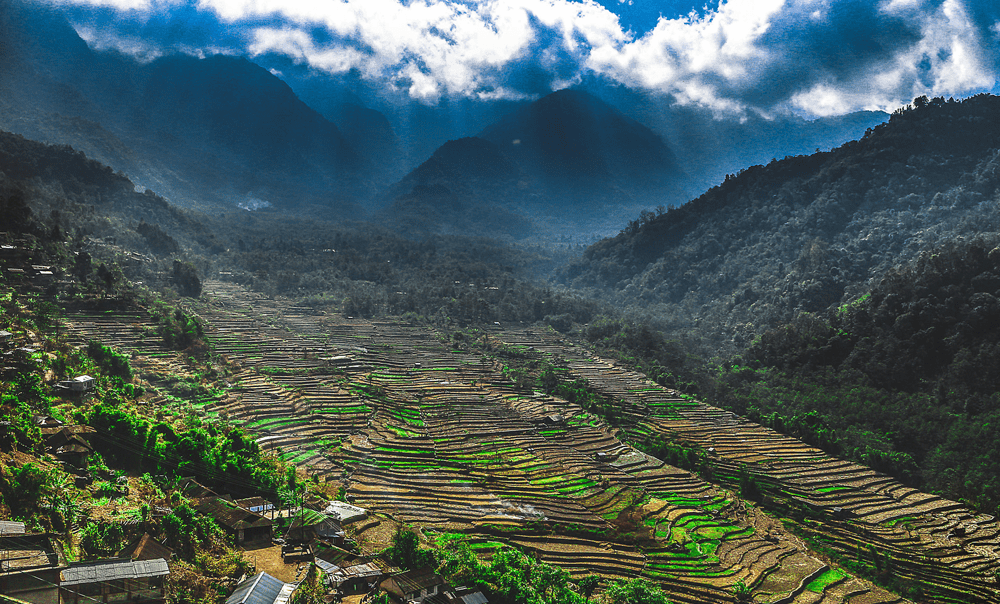

How to reach Khonoma village
Khonoma is situated 20 kilometres west of Kohima. The road leading to Khonoma is both winding and uphill. Taxis are available from Kohima to reach Khonoma, and the cost is around Rs 1000. It is a bit tricky to bargain for the best price in Kohima, so try your luck.

How to reach Khonoma?
Kohima is easily accessible from Dimapur, the nearest railhead. The distance between Dimapur to Kohima is 74km. Dimapur also has an airport of its own. This is well-connected with all the major cities of India.
If you want to visit Kohima from Guwahati, then the best option is by train. There are main trains running between these two stations. The best and time-saving option is to board the Jan Shatabdi Express running from Guwahati to Jorhat.
For a more comfortable and worry-free journey, you can also hire a private cab from Guwahati to Khonoma. The distance from Guwahati to Dimapur is 290 Km, and Kohima is 360km.
A Guide to Longwa Village and the Legacy of the Headhunters of Nagaland
Top Things to Do in Khonoma
Khonoma Forts
Very few people know that the freedom struggle touches Nagaland and Khonoma is a living example of the struggle for freedom, survival and territorial unity.
In 1879, the villagers of Khonoma battled with the British and killed the British officials and armed soldiers and sacrificed almost 40 of their soldiers in the war of independence. Khonoma fort happens to be the place where the Naga warriors battled against the British.
Tombstones are erected to pay tribute to the martyrs who gave their lives in this battle.

Apart from the main fort, there are several small forts that exist around the village. You can watch all these forts by walking around the small alleys of the village.


Khonoma village
The second most important attraction of Khonoma is the village itself. I will tell you in detail about all the hidden places here. While walking around the village, you can observe the skilled villagers making wooden crafts, baskets or weaving clothes.

You can also be delighted by watching the well-decorated village. Colourful flowers blooming in many colours could be seen in everyone’s house. Some of the villagers may invite you to their homes also.


Almost all the household had kitchen gardens supplying their daily need of fruits and vegetables. The whole village seemed like an organic hub with its own gardens and surrounding paddy fields.
The one prime thing in the village is the cleanliness of the village. Nature has gifted this village with such lush green abundance that no material riches can ever match it.
Check Khonoma Pictures: A Photo Blog to know more about the wonderful village.
Graves of the deceased family members
The Khonoma village is unique in one respect. The villagers, members of the Angami tribe, bury their dead family members near their homes. So while exploring the village, we saw people having the graves of their deceased family members near their houses.

Morung of the Khonoma village
Morung Ghor or the dormitory was the school for learning various skills like age-old traditions, woodcrafts, martial art and farming in ancient times. Now the ‘Murung’s exhibited Angami Naga handicrafts, old utensils, traditional arms, musical instruments, etc.
Morungs are like certain community centres where village members display their weaving skills and craftsmanship. Beautiful pictures of animals and birds are also drawn on the walls of the Morung.




Why Khonoma is known as a green village
Due to the cutting of trees in the forests, the environment and ecological balance are disturbed to a high extent. To maintain the ecological heritage and the environmental degradation, the villagers of Khonoma have stopped cutting trees and hunting wild animals and birds in the village forest area since 1998.
A few old hunters and knowledgeable villagers took the initiative to save the forest and stop cutting trees and killing wild animals. Now everyone follows it, and the village is regarded as a green village. They also practice jhum cultivation and shifting cultivation to stop the degradation of hills.
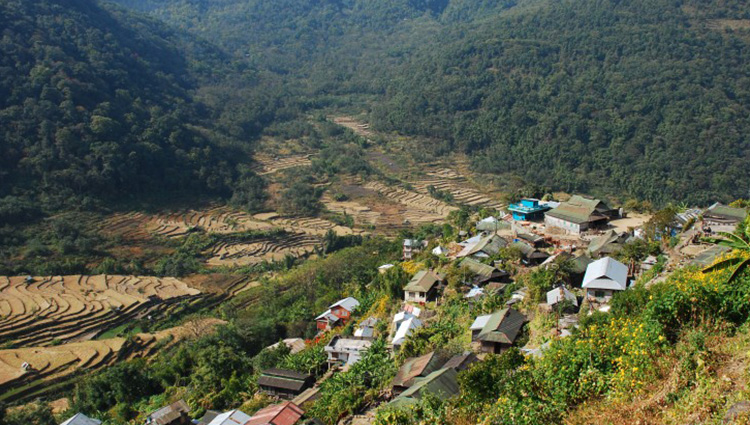
What to Eat
Nagaland has a rich variety of traditional food, which is completely different from the rest of India. If you like to experiment with food, then you can try lots of different Naga Cuisines. I would like to suggest you try pork curry cooked in traditional style using fermented bamboo shoots and fish chutney. Of course, it is very spicy, but you won’t forget the taste once you taste it. Lastly, if you prefer vegetarian, then you can try the boiled vegetable curry cooked using “Axone”, a traditional spice made of fermented soybean available only in Nagaland.

How to travel around
Walking on foot is the best way to explore the village. The village is located on top of a hill. The terrain ranges from gentle slopes to steep and rugged hillsides. Most of the alleys around the village are very small and a bit confusing for a first timer. So please hire a local guide for a day tour in Khonoma. A local guide will cost Rs 500 for the entire day, and there is a small entry fee of Rs 50, which is generally collected in the village gate.

Best time to visit Khonoma
You can visit Khonoma at any time of the year. But the best time is definitely during the Hornbill Festival. You can club together with your Hornbill Festival tour and spend a day in Khonoma village, enjoying closeness with nature, Naga Hospitality at its best.
If you love trekking and nature madly then you can also go for trekking in Dzuleke and Dzukou valley, located just a few kilometres away.
Dzuleke is a small hamlet situated around 20 km from the village of Khonoma. Dzukou Valley is a stunning valley of Nagaland adorned by pristine natural beauty. Dzukou Valley can be accessed only by trekking from Jakhama Village. Read more at Experience the Stunning Dzukou Valley.

Eco‑Tourism & Responsible Travel in Khonoma
1. Support Local Homestays and Guides
Choose to stay in locally-run homestays which not only offers a more authentic experience but also helps support local livelihoods. Hiring a local guide can also deepen your understanding of the village’s unique history, conservation efforts, and way of life.
2. Minimize Plastic and Waste
Avoid bringing single-use plastics. Carry your own water bottle and cloth bag. Dispose of waste responsibly or better yet—take it back with you if there are no proper disposal options available.
3. Khonoma is best explored on foot. Walking reduces your carbon footprint and allows you to appreciate the stunning terraced fields, forest trails, and natural surroundings in a more immersive way.
Where to stay in Khonoma village
Khonoma village has a few standard hotels and tons of homestays, which offer authentic hospitality and mouthwatering food.


Khonoma village homestay
Several local families in Khonoma offer a homestay for guests. You can feel the affability of home and the authenticity of staying with a local family. We enjoyed traditional Naga food and had a delightful time staying in the Khonoma village homestay. Homestays provided all the basic amenities for a comfortable stay. If you want to book a homestay at Khonoma green village please write to us.

Cost of Homestay:
Homestays are very basic, offering basic amenities and amazing food. A homestay will cost Rs 2000 – Rs 3000 per night.
Khonoma tour packages
You can check our Nagaland tour packages or Hornbill Festival tour package to book your guided tour in Nagaland along with Kohima. You can also find guided and personalised Northeast India tribal tour packages curated by Team Nexplore.
Like it! Pin it!

Did you like this post or have any feedback? Please let me know in the comments section below! Or, if you have any further questions, feel free to ask.
Follow us on Instagram, Facebook, YouTube
If you are looking for more information on Kohima and the Hornbill Festival, please check out the page dedicated to Kohima on our website, or email us at support@nexplore.org to start planning your trip!


